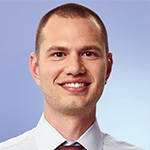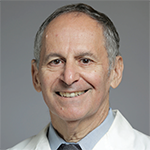 Matthew Baker, MD
Matthew Baker, MD
Post-Doctoral Research Fellow, Division of Immunology and Rheumatology, Stanford University
Background: Dr. Baker took the indirect route to rheumatology: from small-town scholar to an environmental analysis major in college to two years in a cancer research lab at the National Institutes of Health before attending Harvard Medical School, Boston. His goal is to become a translational physician-scientist focused on “characterizing novel autoantibodies in PR3+ ANCA-associated vasculitis.”
“I have always been fascinated by the immune system,” he says. “I became intrigued with the concept of autoimmunity as a medical student and loved the clinical practice of rheumatology as a resident. I was particularly drawn to the thoughtful and multidisciplinary approach of rheumatology, and ultimately, it was a natural fit for me.”
Working in the post-doc laboratory with Dr. William Robinson at Stanford, Dr. Baker is helping identify new targets in disease pathogenesis, specifically validating targets with in vitro and in vivo models. He is also working closely with Mark Genovese, MD, of Stanford University, Palo Alto, Calif., to begin a new investigator-initiated clinical trial in a well-defined subset of patients with SLE. “We employ a technology that allows us to sample blood from patients who are flaring from their autoimmune disease, single-cell sort the activated B cells that are about to make antibodies and sequence the antibody genes in these cells,” he says. “We then compare sequences among individual cells and identify clonal families, which we presume are important in active disease.”
Q: What do you love about rheumatology?
A: No two patients in rheumatology are the same, and there is still so much we do not understand.
Q: What does it mean to be recognized by your peers?
A: It’s an incredible honor. There are so many great trainees across the country, and I feel incredibly lucky to be acknowledged this year. It inspires me to keep working hard and giving back to academic rheumatology.
Q: What is most exciting about being involved in the creation of a new therapy?
A: The most compelling aspect is the ability to potentially offer a beneficial treatment to a patient who has been struggling with their disease and has been refractory to all other modalities. I am eager to learn how to effectively run a clinical trial and further the development of novel therapies.
Q: What advice do you have for the next generation of rheumatology fellows?
A: Stay hungry, stay curious, question everything, and never take a diagnosis for granted. There is so much that we do not know in rheumatology, and we need the next generation to continue to challenge the status quo and drive the field forward.



